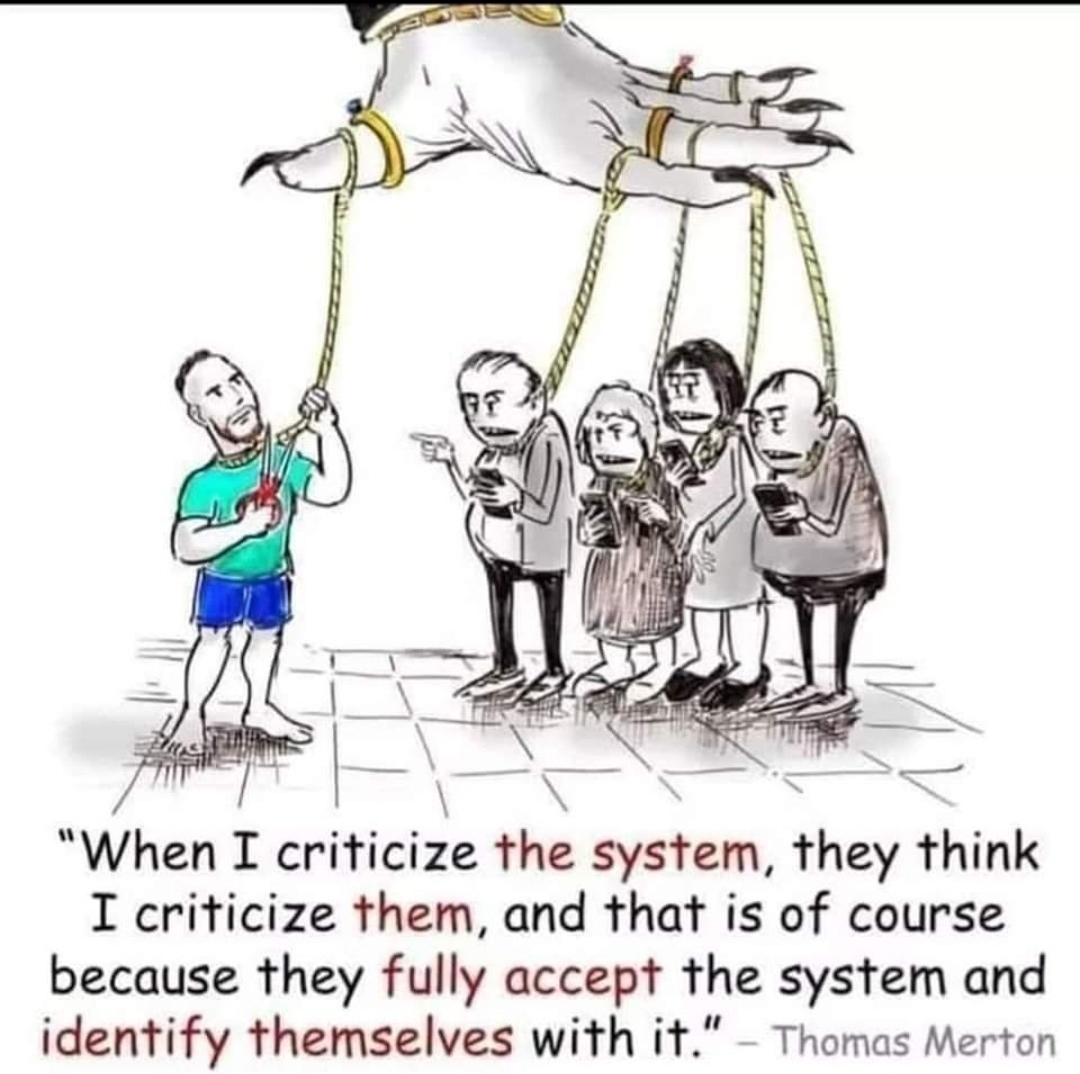“When I criticize the system, they think I criticize them, and that is of course because they fully accept the system and identify themselves with it.” – Thomas Merton
This quote by Thomas Merton, a Trappist monk, writer, and social critic, captures the idea that when individuals fully internalize and identify with a particular system—be it political, social, economic, or cultural—they often see criticism of the system as a personal attack. Merton is highlighting a psychological dynamic where people’s identities become so entwined with the structures or institutions they belong to that any challenge to the system feels like a challenge to their own self-worth, beliefs, or existence.
Key Insights from the Quote:
- Identification with the System:
- Merton suggests that people often merge their personal identity with the larger system they live in or support. When they see themselves as part of the system, they feel personally targeted by criticisms aimed at the system itself. This identification can be so strong that they cannot distinguish between themselves and the broader social, political, or economic structures in which they participate.
- Resistance to Criticism:
- This quote also speaks to the difficulty of critiquing systems or institutions that have become deeply ingrained in people’s identities. When criticism is perceived as a personal attack, it can provoke defensiveness, resistance, and even hostility, making constructive dialogue or change challenging.
- Insight into Group Dynamics:
- Merton’s observation provides insight into group dynamics, where the cohesion and solidarity of a group or institution may be maintained by members’ identification with its values, rules, or norms. When the group or system is criticized, members may react defensively to protect their sense of belonging and shared identity.
- Understanding Social Change:
- The quote also underlines a key challenge in advocating for social change. For change to happen, people often need to disassociate their personal identities from the existing system or be willing to critically examine the parts of their identity that are intertwined with it. This process is often uncomfortable and can lead to resistance or backlash.
Relevance in Modern Contexts:
This idea is relevant in many contemporary debates and conflicts, where criticisms of societal structures—such as economic systems, government policies, or cultural norms—are often met with personal offense and defensiveness. It emphasizes the need for empathy and understanding in conversations about systemic change, recognizing that people’s identities and beliefs are complex and deeply interconnected with the systems they live within.

Thomas Merton’s quote, can be applied to America’s two-party system to illustrate how political identities have become deeply entrenched and personalized.
Application to America’s Two-Party System:
- Identification with Political Parties:
- In the U.S., many people strongly identify with one of the two major political parties: the Democratic Party or the Republican Party. This identification often goes beyond support for a party’s policies or candidates; it becomes a core aspect of a person’s social identity. For these individuals, criticism of “the system”—meaning the broader political, electoral, or governing structures in which both parties operate—is often taken as a personal attack because they see their chosen party as an integral part of who they are.
- Polarization and Defensive Reactions:
- Merton’s quote is particularly relevant in a climate of intense political polarization. Criticisms of either the Democratic or Republican parties—or of the two-party system itself—are frequently met with defensive reactions. For example, if someone criticizes the dysfunction or corruption of the two-party system, party loyalists may interpret these criticisms as attacks on their personal values, their intelligence, or their moral character, because they closely associate themselves with their party’s platform and ideology.
- Resistance to Systemic Critique:
- When people identify strongly with a political party, they are more likely to resist critiques of the larger political system (such as the electoral process, campaign finance, gerrymandering, or media biases). This resistance stems from a feeling that such criticisms challenge their own beliefs or the legitimacy of their political identity. As a result, meaningful discussions about systemic reform or alternative political structures can be sidelined or dismissed.
- Reinforcement of the Status Quo:
- The two-party system tends to reinforce itself partly because of this deep identification. Individuals and groups who challenge the two-party system by advocating for third parties, structural changes (like ranked-choice voting), or campaign finance reform often face backlash. Many people perceive such critiques as undermining their own party’s power or legitimacy, leading to a defense of the status quo rather than an openness to systemic change.
- Impediments to Bipartisanship and Collaboration:
- Merton’s insight helps explain why bipartisan collaboration is often difficult. If members of each party view the other as fundamentally opposed to their core identity, then any critique of the political system or call for compromise is seen not just as political strategy but as a betrayal of fundamental values. This dynamic leads to gridlock, where opposing sides are more focused on defending their identities than on finding common ground.
- Undermining of Civil Discourse:
- In a two-party system where political affiliations are so closely tied to personal identity, civil discourse becomes more challenging. Political debates often devolve into personal attacks or accusations rather than thoughtful discussions about the strengths and weaknesses of the system. Merton’s quote highlights how the blurring of personal and systemic critique can make it harder to engage in reasoned, constructive debate.
Merton’s observation underscores how deeply people can internalize and identify with political systems, to the point where criticizing those systems feels like a direct attack on their own identity. In America’s two-party system, this phenomenon contributes to polarization, impedes systemic reform, and complicates efforts to find common ground. For meaningful change or collaboration to occur, there must be a recognition that criticisms of the system are not necessarily criticisms of individuals—and that understanding and detaching from these identities might be necessary to see the flaws of the current political system more clearly.







